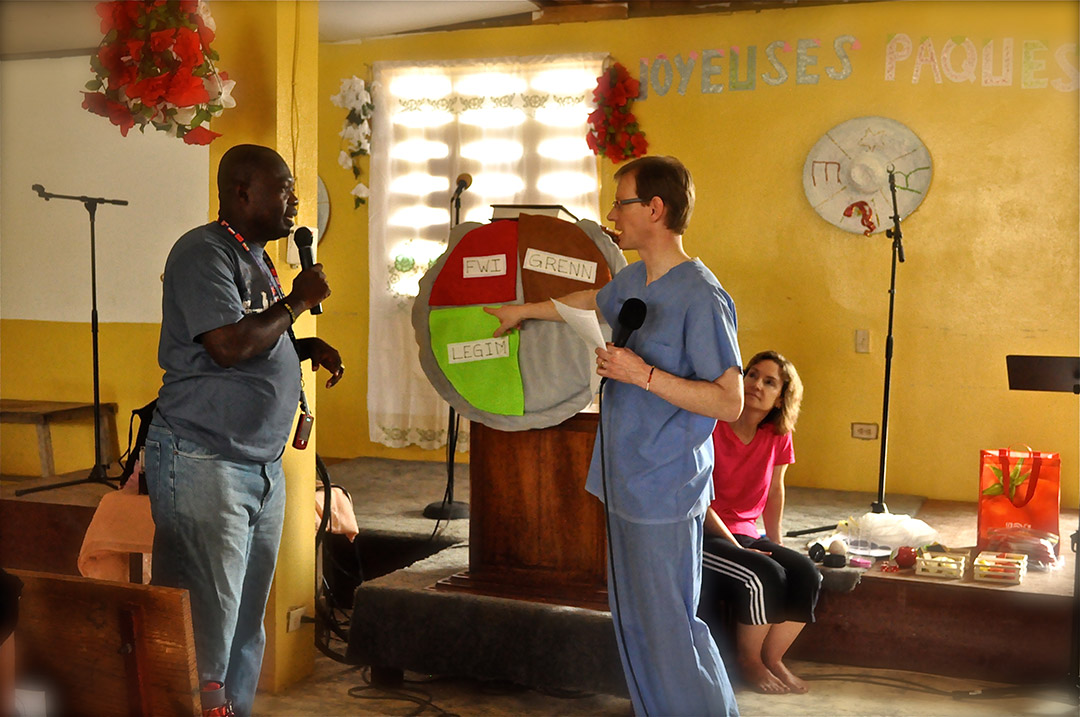RIT offers new degree in global public health
Amy Crawford
RIT professor John Oliphant leads a public health talk in Haiti about nutrition. Oliphant is the director of the new global public health degree program.
From mpox, COVID-19, and Ebola to gun violence, the opioid epidemic, mental health, and access to healthy food, among other issues, global public health has a broad reach with a common goal—improve people’s health and living conditions, prevent disease and injury, and promote equity in health care to help people everywhere reach their full potential.
Rochester Institute of Technology is offering a global public health BS degree program and is accepting students for fall 2025. The new degree program will prepare students for public health careers, medical school, clinical health professional programs, law school, and many other graduate degrees, according to John Oliphant, RIT global public health program director and a physician assistant. Oliphant is also the assistant medical director for Associate Health at University of Rochester Medicine Thompson Health.
Graduates from the program will find careers in the public health workforce, health care systems, not-for-profit and non-governmental organizations, and other humanitarian groups. The global public health degree will prepare students for advanced degrees in medical and legal fields, education, international relations, government policy, epidemiology, and health informatics, for instance.
RIT’s global public health curriculum offers two specialty concentrations—global health management and infectious disease.
The global health management track focuses on policies and practices needed for leadership roles in health care or humanitarian organizations. The infectious disease specialty is an option for students considering medical school or pursuing other clinical health professions.
“Our global public health program will be a great launching pad for medical school,” Oliphant said. “STEMJobs.com has listed a bachelor’s degree in public health as one of the best pre-med degrees for students to pursue.”
All students in the global health program are required to complete two summer co-ops or internships, and international experiences are encouraged.
A course offered in the spring semester will compare the differences between public health and health care practices in the United States and the Dominican Republic. During spring break, students will visit the Dominican Republic for an immersive educational experience.
Oliphant has extensive experience providing health care and public health educational programs in Haiti. He also has consulted and conducted research in Liberia, where he is certified physician assistant and honorary tribal chief.
“Global public health is a multidisciplinary field, and we are tapping into the significant expertise that exists among the faculty in the College of Health Sciences and Technology and in several other colleges at RIT for the delivery of the content in this program,” Oliphant said. “I am glad a program like this can bring us together for the greater good.”
Growing interest among RIT students in global public health has already led to a popular minor, and this fall, students can start a new global public health immersion.
Students can also join the Global Public Health Association @RIT. Active members develop leadership skills while working with faculty and community mentors to host educational and service events, and an annual professional conference each spring. Last year’s Innovation in Global Public Health conference focused on mental health and featured speakers from six different countries.
For more information about RIT’s Global Public Health BS program, minor, or immersion, contact John Oliphant at jboscl@rit.edu.












